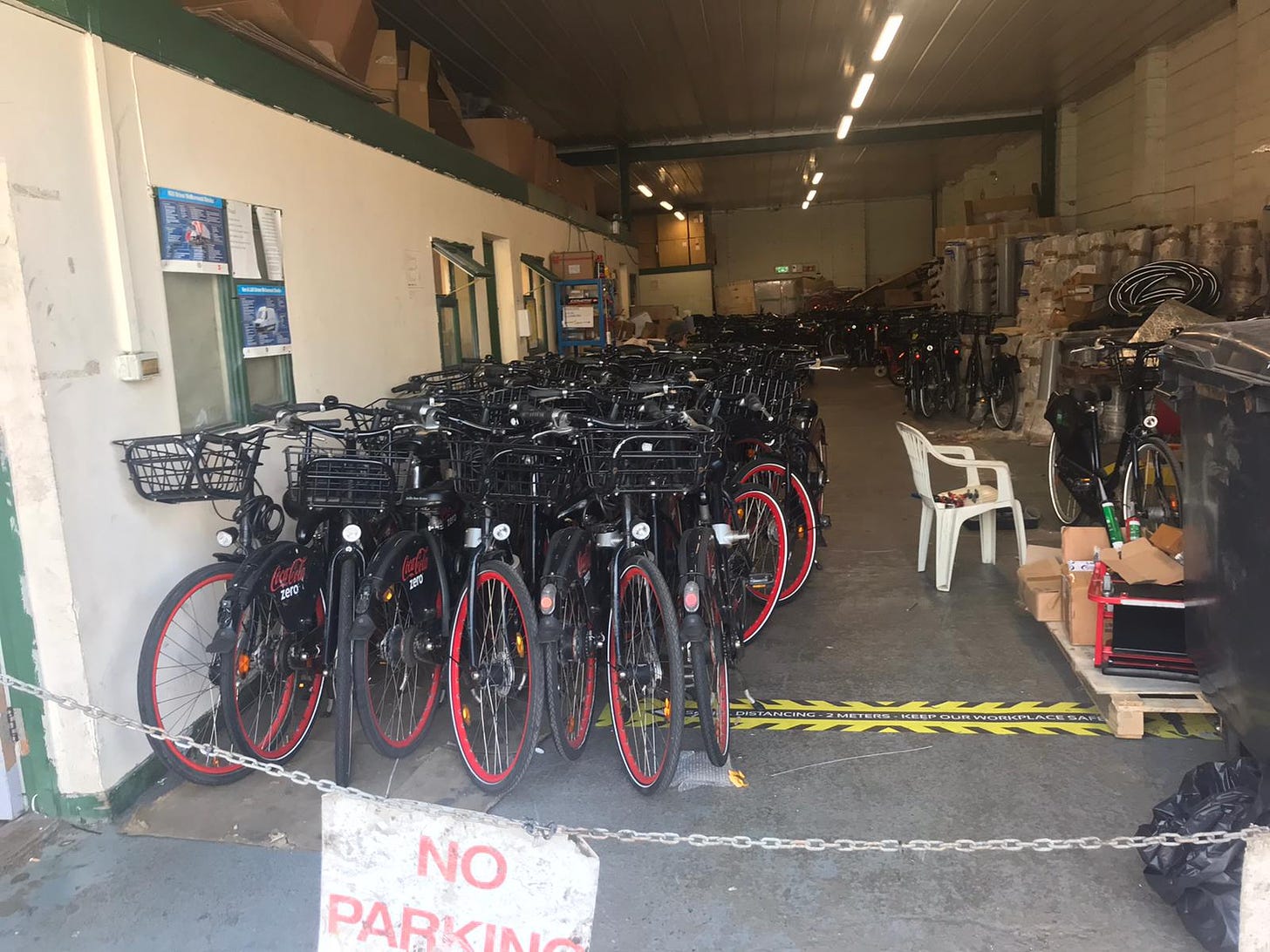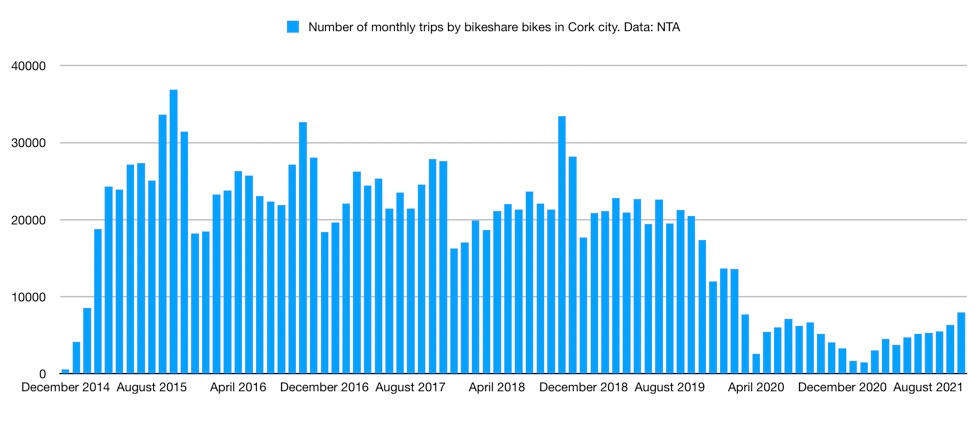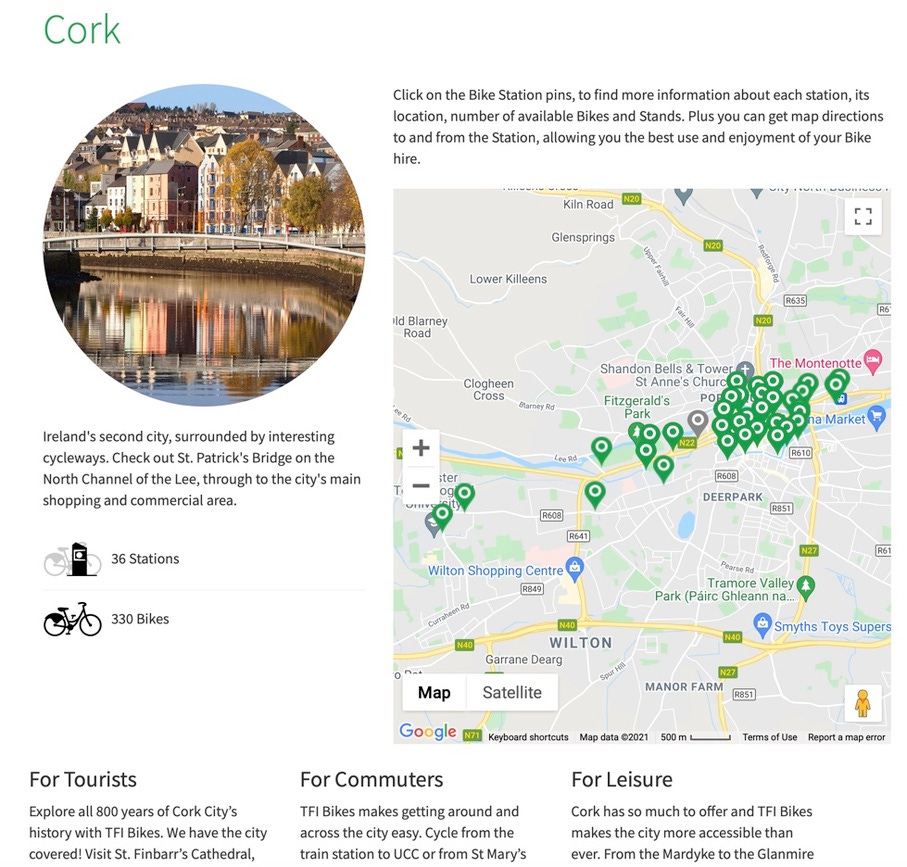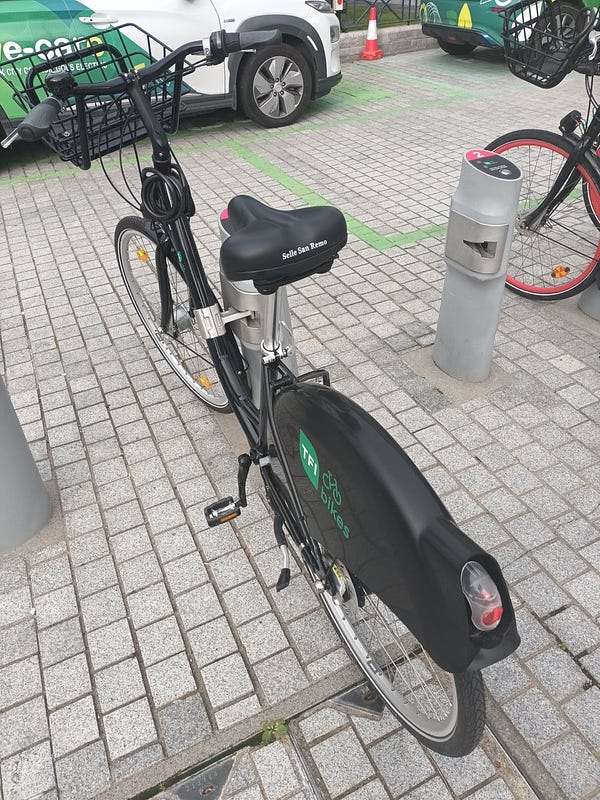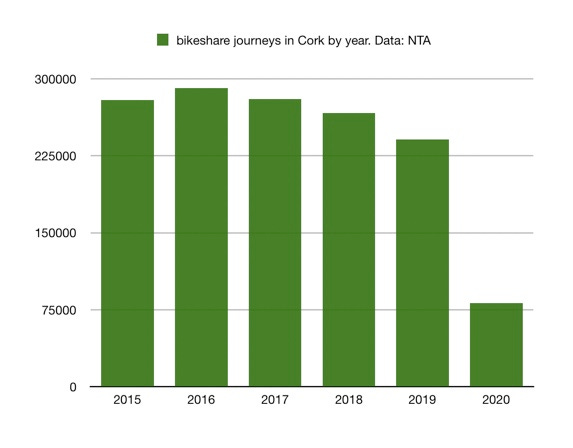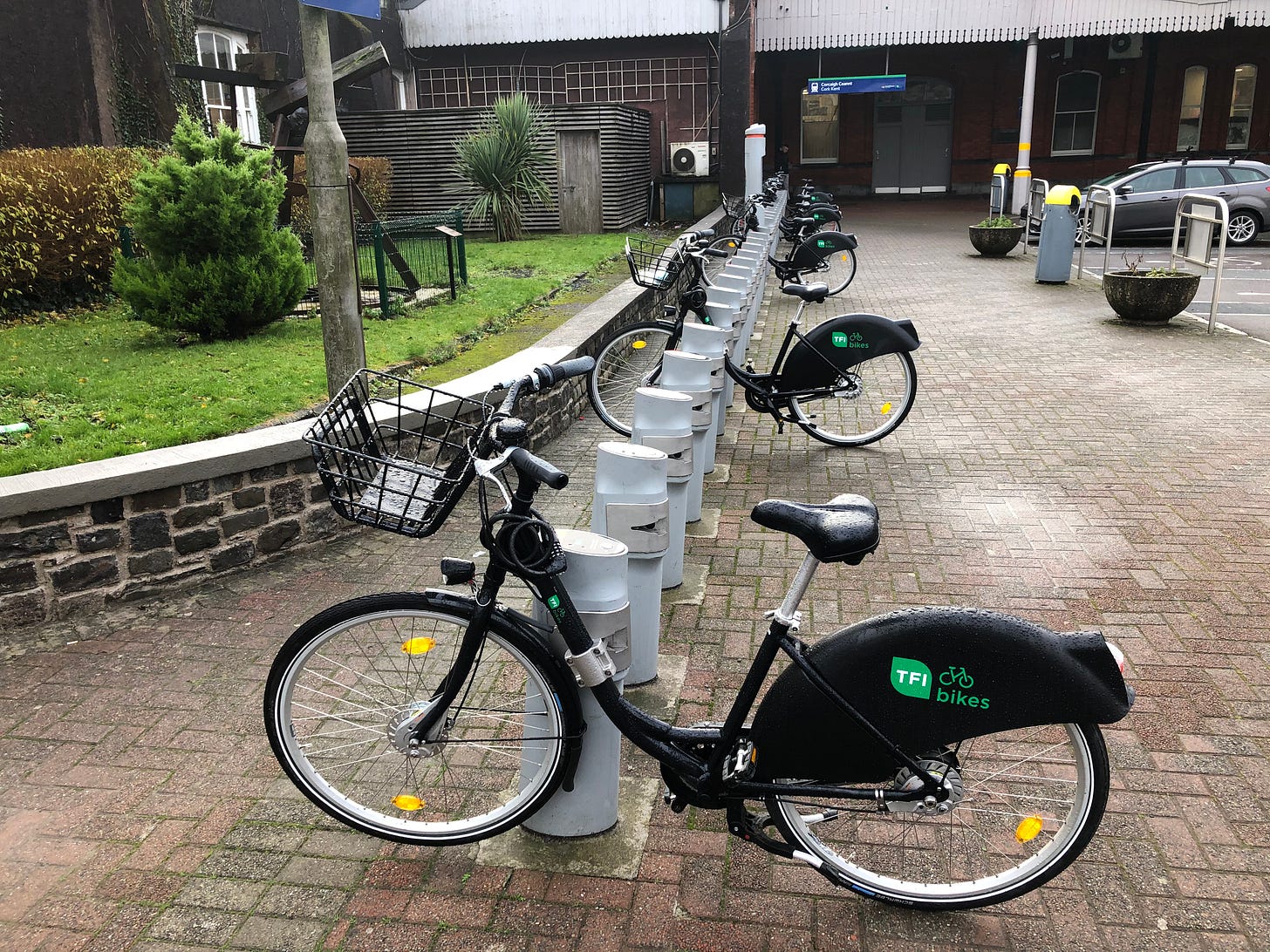Cork's bike share scheme: what's the story?
Once heralded as a triumph for active transport in the second city, the former Coke Bikes rental scheme is now beset with declining numbers, stalled High Court cases and maintenance issues.
In a commercial unit near Cork city, a large number of rental bikes from the National Transport Authority’s (NTA) regional bike share scheme are being stored.
The bike share scheme was hailed as an enormous boon for active transport in Cork, Limerick and Galway when it was officially launched in March 2015.
Dublin had been running a successful bike share scheme since 2009, and now the regional cities were going to be able to benefit from a series of stations connecting strategic locations linking rail and bus to third level institutions and busy city destinations.
740 bikes were acquired, of which 320 would be located in Cork, 215 in Limerick and 205 in Galway.
This would result in an additional 700,000 cycling trips per year taking place across the three cities, it was predicted. But this would never come to pass.
Behind the scenes, the consortium of four companies formed to install and administer the scheme dissolved in acrimony and High Court actions.
There has been a steady decline in the number of monthly journeys taken by rental bike across all three cities. In Limerick, usage figures dropped by 20% in 2019; Limerick Councillor Elisa Donovan penned a very interesting blog post entitled “Why the Limerick/Cork/Galway bike scheme is failing” last year.
In Cork, according to the figures I received from the NTA, the peak year of usage is now five years ago.
We’ll take a look at potential reasons for the decline shortly, but first, there’s another frankly mystifying element to the story; it appears that, although Cork is supposed to have 330 rental bikes in circulation, the real number of bikes in use could be lower.
Where are all the bikes?
The TFI bike share website states that 330 bikes are available at 36 stations throughout Cork city.
During Storm Barra’s Red Weather Warning, when it was extremely likely that not a single bike was in use, I went to the bikeshare.ie website and counted the bikes listed on the interactive map as being present at the 36 stands throughout the city.
262 bikes were listed as being docked in stations.
But others have told me that there’s no correlation between the number of bikes listed online as being parked versus the number that are physically present. I wanted to test this.
So this morning, I covered as much of the city as I had time to.
I counted bikes at 21 of the city’s 36 stations. What I found was bizarre. At only four stations - City Hall, South Main St, Camden Quay and Patrick’s St - did the number of bikes listed on the website tally with the number that were present.
At most of the rest, the number was higher on the website than on the stands, even though at some stations, there were more bikes present than were listed on the map.
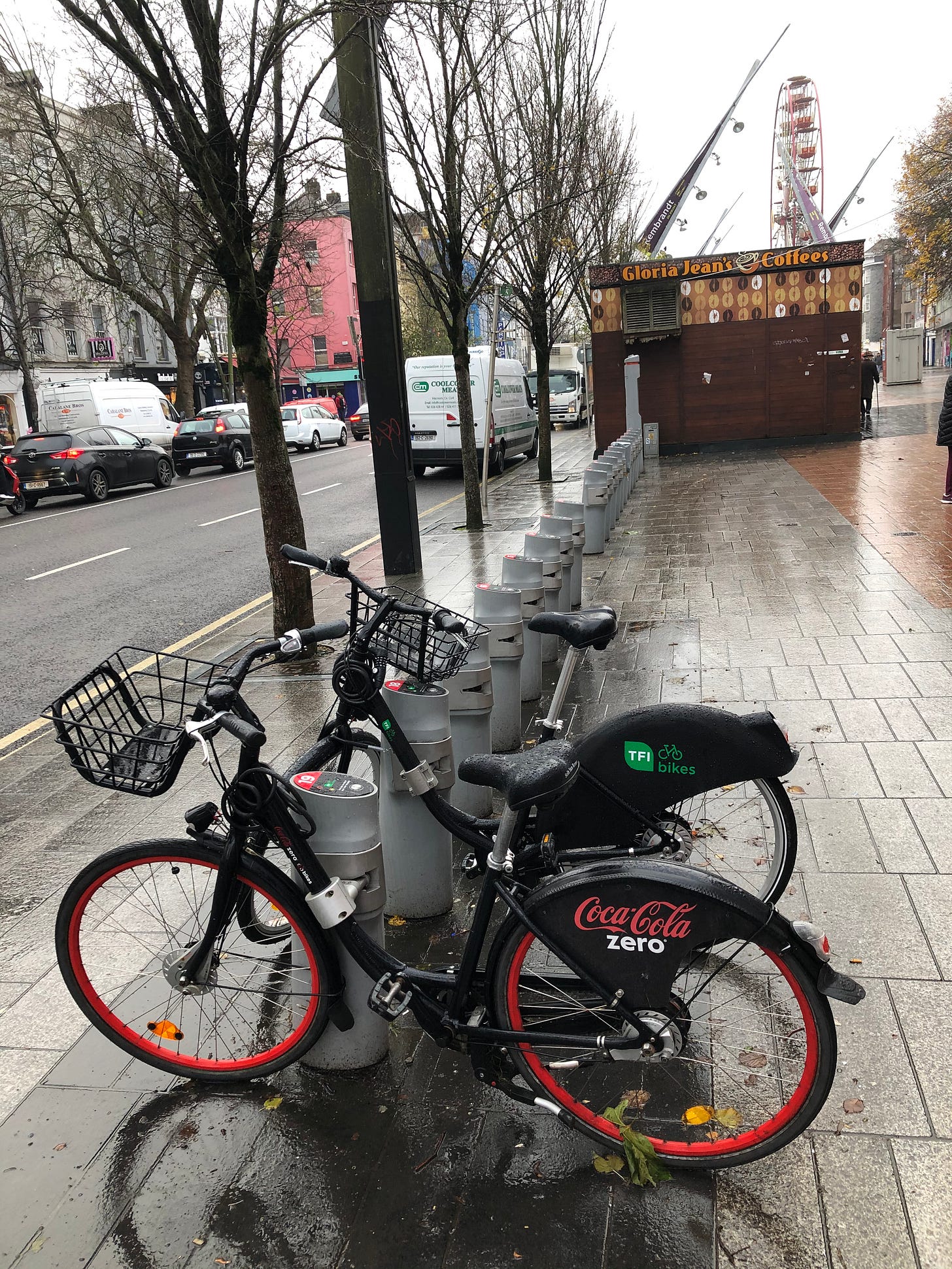
In total, from 139 bikes listed as being present at the 21 stations I visited, there were 116.
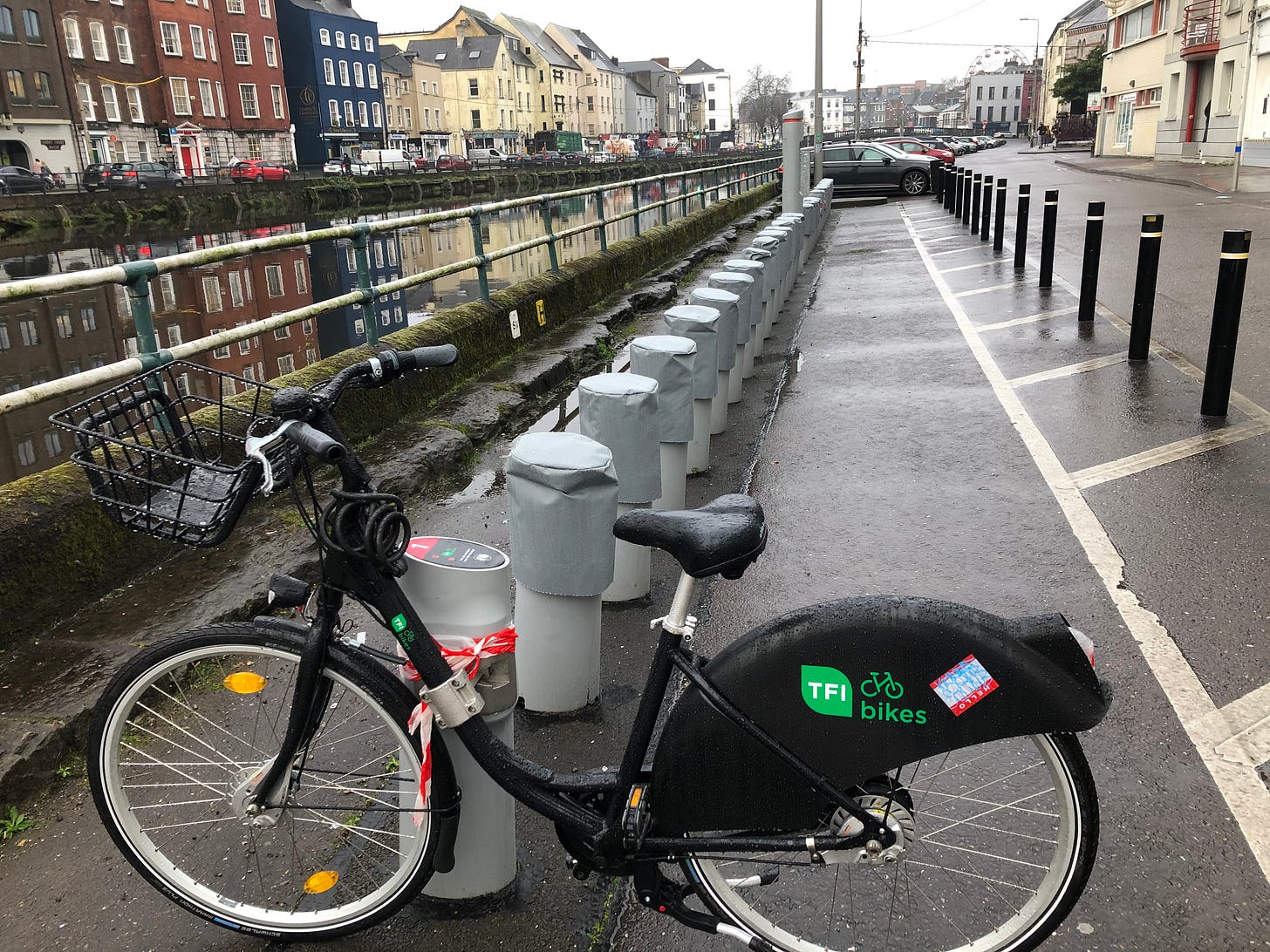
So even the figure of 262 bikes in circulation as counted on the website is in question.
It would be expected that a proportion of the bikes would be in for repairs, but surely not 20% or more?
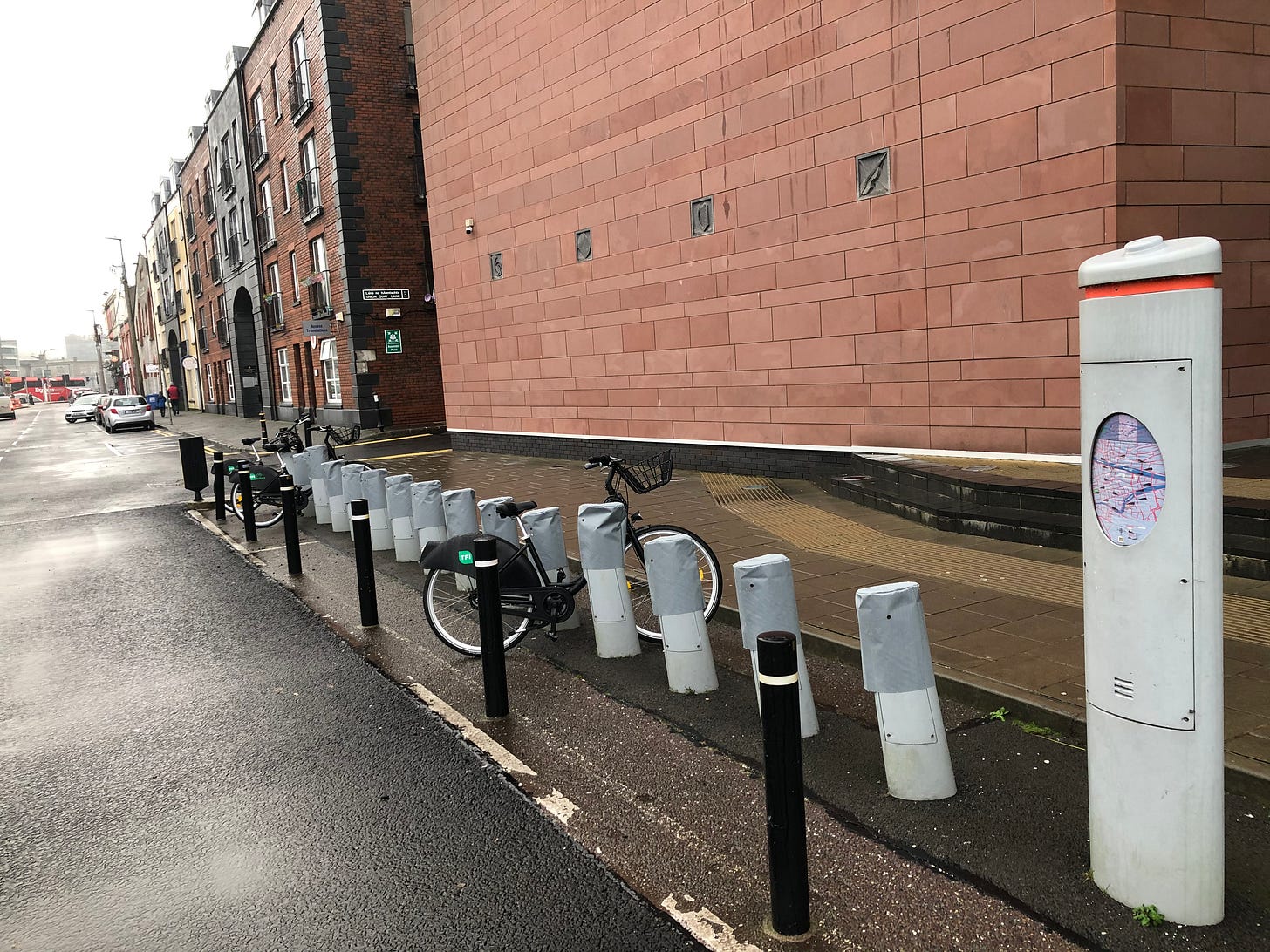
And how can it be that the website is not accurate? Of course bike rental is a dynamic system and people are constantly taking them out, but surely the bike station is recording the location of the bikes and sending the information to the website? What good would the website be if it couldn’t reliably tell users how many bikes and how many stands were available in real time?
I contacted Telfourth Ltd, the Irish company contracted for the maintenance of the scheme, to ask how this was possible. A spokesperson told me that all questions needed to be directed through the National Transport Authority (NTA), on whose behalf they manage the scheme.
I sent a detailed list of questions to the NTA and requested an interview with a representative. They had not compiled the answers to my questions by the time we published this so I will publish an update as soon as they do.
If only 262 bikes are available for public use as I counted, this means that only 79% of the bikes that the NTA is paying for are actually in circulation in Cork. Of course, we would expect a small proportion to be out of use for the purposes of repair and redistribution, where bikes are put on a diesel truck and driven back to the busiest stations, at any given time. We might also reasonably expect the company to have spares to ensure the number in circulation is the number advertised.
Rebranding
The bike share scheme required an initial investment of €8,550,112 to cover the cost of the installation in 2014 plus the first five-year period of maintenance and operational costs for all 740 bikes across Cork, Limerick and Galway.
Coca Cola picked up the tab for €3 million.

In a sponsorship deal which may not have left such a saccharin-sweet taste in the mouths of some, the rental bikes were initially branded with the Coca Cola Zero logo.
The Coke sponsorship elapsed in 2019; indeed, Coca Cola Zero itself was rebranded as Coca Cola Zero Sugar in 2017. The NTA did not seek alternative sponsorship when the deal elapsed; it now foots the annual €1.02 million maintenance bill for the bikes across the three cities itself and is gradually replacing the bikes with the TFI (Transport For Ireland) logo.
If this is the reason why a large number of bikes with the Coca Cola branding are currently in storage in commercial units, Telfourth Ltd or the NTA have not explained this to me.
The NTA bikeshare scheme is now set for expansion into Waterford; originally 14 stations had been planned by the end of 2021 but these have been delayed until 2022.
Usage “flatlined”
Of course, Covid-19 lockdowns and restrictions in 2020 and 2021 have reduced the usage of the bike scheme significantly. But even prior to 2020, it’s clear that the usage was in a pattern of slow decline, from a peak of 291,174 journeys in 2016.
In spring 2020, the NTA made the claim that the pattern of reduction in use across the regional scheme, which was even worse in Limerick and Galway than in Cork, was due to an improvement in bus services.
Cork City Councillor Colette Finn does not believe this to be the case and says she believes their usage is being disincentivised by frustrating experiences for users with bike maintenance and distribution.
“How did they get that information?” she says. “Have they done a survey? Did they go around all the bus users and ask if they used to use the bike share scheme? How do they know?”
Following her election in 2019, Colette Finn started querying the state of repair of the rental bikes; she had used them herself, and had started noticing maintenance issues with the bikes themselves.
“I raised it because there were problems with maintenance of the scheme,” she tells me. “There’d be broken gears or broken tail lights, seats that couldn’t go up or down. The condition of the bikes is such that I think people aren’t renewing their cards.”
This is actually her own experience: “I renewed my card in February and I think I’ve used the system twice. The card I got didn’t work at the kiosk on Grand Parade. When I range bikeshare, they just said, ‘oh, I’m not sure if it’s the card or just the stand, so can you go and try it somewhere else?’”
“So I have to go around and try to find out if there are wonky stands or wonky cards? Why should I have to do that? I’m a user; send me a card that works. Maybe that was unreasonable of me, but I haven’t used it since because I don’t know if the card actually works.”
“It’s quite cheap, so even though I’m very dissatisfied with the service, I haven’t cancelled my card because I’m hoping that at some stage, someone will actually provide a proper service and then I’ll start using it again.”
For Colette, the answer in ensuring the scheme is attractive and convenient for users is in getting the local authority to have oversight of the scheme. The Dublin-based NTA, she says, have responded with '“oh, we didn’t realise that, we’ll get on to it,” when she has contacted them to report damaged bikes in need of repair.
“I would like to see the local authority take control of it and a budget from central government for it,” she says.
“Who is actually supervising it? I’m not really sure. The local authority isn’t, and I can’t get anyone to tell me oh yes, that’s my area of responsibility. I’m being directed to the NTA. But I don’t think they know what’s on the ground so who’s actually supervising the whole thing. I don’t know who’s monitoring this, to be honest. ”
She has asked for more detailed information to be provided; a monthly report only contains overall figures for numbers of journeys and she feels information on the number of bikes in circulation, the number of repairs and similar, should all be available for a publicly funded project such as this.
“There’s nothing about how many bikes are broken or out of service,” she says. “I asked if we could get more information and the response was, oh, I’ll ask the NTA. There’s been no improvement. It’s just the number of journeys and that’s just flatlined, absolutely plummeted.”
€11,554 per bike: €2.57 per journey in Cork
The maintenance of each bike in the scheme is €1,380 per year according to this report, with the NTA paying the operators €85,100 per month, or €1,021,200, to maintain the 740 bikes.
But the overall cost per bike over the first five years, including the capital investment, works out at €11,554 per bike.
This means that in Cork, each of the 1,440,083 journeys undertaken by the 320 rental bikes over the first five years cost €2.57.
Of course, Coca Cola picked up the tab for some of this.
Tangled business webs
Four companies applied for the original NTA tender for the scheme as one consortium, pooling expertise in hardware, software, maintenance and management. Experienced French company Tracetel would provide the hardware: docking points etc. Irish company Mobile Research Solutions Ltd, trading as ParkbyText, would handle the software elements. A small bike rental firm called West Ireland Cycling would deal with maintenance, and a Luxembourg semi-state would provide management and training expertise from their own experience.
The tale of what unfolded following the awarding of the tender is a tangled web indeed.
In January 2014, it was agreed that the four companies would set up a new limited company called An Rothar Nua Ltd to fulfil their tender. But search the Companies Registration Office (CRO) database and you will find no such company.
Instead, the ParkByText directors registered the name Telfourth Ltd with the CRO on the 9th of April 2014.
The owner of West Ireland Cycling initiated a High Court action shortly after, saying his company share had been reduced and altered and that his role in the consortium had been shrunk.
Telfourth Ltd’s directors are also the owner of a dockless rental bike company called Urbo, which was licenced to manage a dockless scheme in Dublin back in May 2017; following problems in the UK, they never actually launched the Dublin scheme.
In 2017, Tracetel initiated a High Court action against the National Transport Authority and Telfourth Ltd, claiming that the Irish element of the consortium had taken advantage of quality control ISO information provided by Tracetel to copy the French company’s designs and expand the bike scheme, with an additional eight stations installed in Galway and two in Cork, using designs Tracetel claim are their intellectual property.
This IP case, currently stalled, makes the third High Court action centred around the An Rothar Nua consortium. It’s even been the subject of a mild diplomatic incident involving the French Ambassador.
In January 2018, the National Transport Authority renewed An Rothar Nua’s contract for another five year period, despite all this controversy.
A plan for ten new stations in Cork did not materialise in 2019 as planned, but in October 2021, it was announced on the TFI website that five new stations had been opened in Cork, as reported in detail on Thomas Milde’s blog here.



